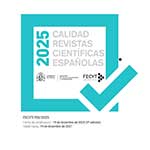The use of IA as a tool for academic research: legal anbd ethical constraints on the path to its normalization
Abstract
In recent years, artificial intelligence (IA) has made qualitative leaps, becoming a technology accessible to all with vast potential to enhance productivity. Its rapid global proliferation has made it a common tool across various fields, inlcuding academia, where it is utilized in both teaching and research as an advanced coding software. However, it is crucial to address and mitigate the risks associated with its use. A study of the publication guidelines from 32 international publishers reveals a consensus: while AI's capabilities in preparing scientific articles are acknowledged, it should be regarded solely as a atool and never as a co-author. Publishers emphasize the importance of responsible AI use, adhering to ethical standards, with any violations attributed to individuals. Additionally, best practices for AI usage in academic literature are summarized, with non-compliance being the responsibility of the authors. These standards are expected to evolve as knowledge and empirical experience in the field grow. In conclusion, collaboration among academic publishers to establish universal criteria is essential to mitigate risks.
Article download
License
In order to support the global exchange of knowledge, the journal Derecom. Derecho de la Comunicación is allowing unrestricted access to its content as from its publication in this electronic edition, and as such it is an open-access journal. The originals published in this journal are the property of the Complutense University of Madrid and any reproduction thereof in full or in part must cite the source. All content is distributed under a Creative Commons Attribution 4.0 use and distribution licence (CC BY 4.0). This circumstance must be expressly stated in these terms where necessary. You can view the summary and the complete legal text of the licence.







